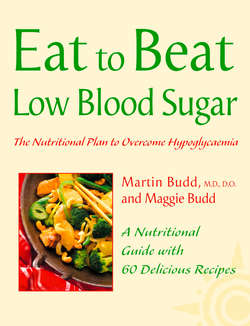Читать книгу Low Blood Sugar: The Nutritional Plan to Overcome Hypoglycaemia, with 60 Recipes - Martin Budd N.D. D.O. - Страница 13
General symptoms of low blood sugar – the two stages
ОглавлениеSTAGE ONE SYMPTOMS – FALLING BLOOD SUGAR
The immediate symptoms that follow a fall in blood sugar result from a reduction in the brain and nervous system fuel (i.e. glucose). These first stage symptoms generally include mental and physical lethargy, partial or total loss of concentration, headaches, trembling and/or dizziness, a tendency to yawn, paleness of lips and face with either a skin coldness or heat with perspiration, unexplained anxiety and a sudden urge for chocolate or anything sweet.
STAGE TWO SYMPTOMS – ADRENAL COMPENSATION
The second stage symptoms are caused by the adrenal response to the low blood sugar level. For many people these symptoms are more distressing than those of the first stage.
The surge of adrenaline that occurs in response to low blood sugar causes symptoms identical to the body’s response to stress. The metabolism is literally revved up for action. The heart rate increases and the blood flow to muscles is stepped up. This can be likened to pulling out the choke on a car to increase the available fuel. Heavy sweating can occur, with breathlessness and unpleasant palpitations.
A frequent consequence of the stress reaction is a degree of irritability or even aggression – a good example being the mood swings of the diabetic patient. Those readers who have a diabetic friend or relative will know only too well that when a ‘hypo’ occurs the victim becomes both irritable and aggressive. Many people with low blood sugar symptoms show a degree of anxiety, irritability or depression – symptoms that often improve as their problem is resolved.
All this is part of our body’s normal reaction to stress. If we are confronted by an angry bull as we cross a field we need to increase our oxygenation, heart rate and muscle strength to hastily flee. Most athletes and competitive sports people know the value of this adrenaline effect, for the power and speed increase it can provide. They learn to control and at times to override the adrenal response to further their sporting goals.
For most of us this alarm-response by our body is in direct proportion to the intensity of the threat or stress. However, many who suffer with chronic low blood sugar lose their fine control and an adrenal hair-trigger response to stress of any kind leads to frequent and often unnecessary alarm-responses. When adrenaline is released on a regular basis for trivial reasons, many distressing symptoms can develop. Some sufferers, for instance, are frequently awakened at 3–4am bathed in sweat, anxious, with a rapid pulse and short of breath. This occurs because the adrenal response to their nocturnal low blood sugar is being inappropriately triggered and their metabolism is stressed.
Unfortunately, even when we sleep changes in the blood sugar can activate the adrenal response. Professor Hans Selye, who wrote the definitive first description of our response to stress in his landmark 1956 book The Stress of Life, described sleep as follows: ‘No one is ever absolutely at rest, while alive. Even during sleep, your heart, your respiratory muscles, your brain continue to work. It makes no difference that you are not conscious of this and that these activities require no voluntary effort on your part’.
Our management of stress is a very individual quality that depends on many factors. The amount and type of activity appropriate to a five-year-old child would be very stressful for a 75-year-old man and vice versa. Our stress load and our stress handling are unique to each of us. Stress can, of course, be on many levels, psychological, chemical, structural or environmental. It does not always need to be unpleasant or unexpected to give rise to symptoms. Enjoyable, planned events can also be stressful – excited children becoming sick at parties and sports people suffering asthma attacks are examples of this.
